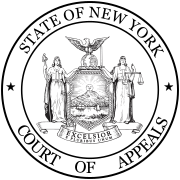Lunney v. Prodigy Services Co.
Appearance
| Lunney v. Prodigy Services Co. | |
|---|---|
 | |
| Court | New York Court of Appeals |
| Full case name | Alexander G. Lunney v. Prodigy Services Company, et al. |
| Decided | December 2 1999 |
| Citation | 723 N.E.2d 539; 94 N.Y.2d 242; 701 N.Y.S.2d 684 |
| Case history | |
| Prior history | Defendant's motion for summary judgment denied, Sup. Ct. Westchester Cty., July 2, 1997; renewed motion for summary judgment denied, Sup. Ct., Jan. 14, 1998; rev'd, 250 A.D.2d 230 (1999) |
| Subsequent history | Cert. denied, 529 U.S. 1098 (2000) |
| Holding | |
| An internet chatroom provider could not be considered the publisher of defamatory material posted by an imposter account because of its passive role in monitoring the chatrooms. Appellate Division affirmed. | |
| Court membership | |
| Chief judge | Judith S. Kaye |
| Associate judges | Joseph W. Bellacosa, George Bundy Smith, Howard A. Levine, Carmen Beauchamp Ciparick, Richard C. Wesley, Albert M. Rosenblatt |
| Case opinions | |
| Majority | Rosenblatt, joined by Kaye, Smith, Levine, Ciparick, Wesley |
| Bellacosa took no part in the consideration or decision of the case. | |
Lunney v. Prodigy Services Co., 94 N.Y.2d 242 (1999) is a leading U.S. law case on liability of internet service providers for defamation. The court held that Prodigy, an internet chatroom provider, was not considered a publisher of defamatory material posted from an imposter account due to its passive role in monitoring the chatrooms.
External links
[edit]
